Shep Hyken's Blog, page 166
June 28, 2017
How Can Thinking Small Propel You to Greatness?
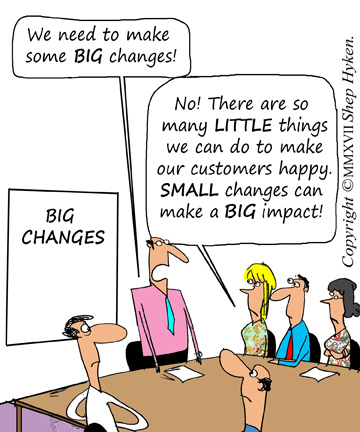 It was a major meeting for my friends at Volkswagen Australia. This was their Customer Experience Summit, and the theme for the meeting was “Think Small: Big Differences Come from SMALL Details.”
It was a major meeting for my friends at Volkswagen Australia. This was their Customer Experience Summit, and the theme for the meeting was “Think Small: Big Differences Come from SMALL Details.”
Jason Bradshaw, the Director of Customer Experience, shared his vision about Volkswagen Australia being recognized and known for their amazing customer service. His goal is for VW to be one of the best in the industry. His bold move was to tell the audience, which consisted of the ownership and management of the Volkswagen dealerships throughout the country, that everyone should think small. Really? How can thinking small propel you to greatness? Well, it turns out Jason was onto something… BIG!
It doesn’t matter what type of business you are in, the bar for typical – or average – customer service is set low. Very low. That is a shame because virtually any business that doesn’t yet have a stellar reputation can be more competitive and successful if they would pay more attention to how they deliver customer service. All they have to do is be better than average – higher than the bar. And, how much better do they have to be? Just a little better. A small improvement. A minor tweak. That’s what makes big differences. And when that “just a little above average” interaction is something that happens again and again, as in it being consistent, then the customer says, “You are amazing!”
There are two parts to this concept you must pay close attention to. First, you have to find the places to be above average. Break down every interaction, or touch point, that you and your organization have with the customer. Then look for a way to make it better – even just a tiny bit better. Yes, it’s okay – even encouraged – to think small.
Second, you have to bake it into the process or system. It must be consistent. All the time. Not great one day and just okay the next. Anything less erodes the customer’s confidence.
Some of you might have been told to be bold and to think big! I love the idea of thinking big. Anything can be considered. The craziest ideas can and should always be shared. And, when you get an idea that works, then you have the opportunity to improve. But, sometimes those opportunities are few and far between. And, big could also mean expensive. Yet, I don’t think anyone would disagree that it is easier to think small – and it’s much easier to implement small ideas. Lots of small things can become a big deal.
All Jason Bradshaw of VW wants his dealerships in Australia to do is to embrace the concept of improving customer experience by just one percent. That’s it. Just one small percentage point. Make it one percent better than average. And, doing that across the board can mean huge improvement. It’s noticeable because it’s consistent. Thinking small the right way can be huge!
Shep Hyken is a customer service expert, keynote speaker and New York Times bestselling business author. For information contact or www.hyken.com. For information on The Customer Focus™ customer service training programs go to www.thecustomerfocus.com. Follow on Twitter: @Hyken
(Copyright © MMXVII, Shep Hyken)
Save
Save
The post How Can Thinking Small Propel You to Greatness? appeared first on Shep Hyken.
June 27, 2017
Amazing Business Radio: Blake Morgan
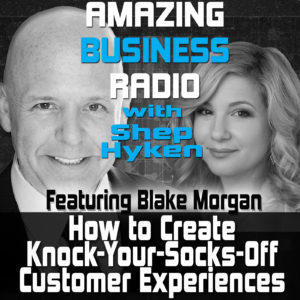
Blake Morgan Shares How to Create Knock-Your-Socks-Off Customer Experiences
How do you create a customer experience that doesn’t just get business, but keeps customers coming back for more?
Shep Hyken interviews customer experience futurist, Blake Morgan, about her life, her book, and how to do more for your customers.
First Up:
Shep discusses his history with Blake, compares her book “More is More” with his amazement concepts, and mentions the importance of exceeding customer expectations — including the expectations that they don’t yet know that they have.
Featured Interview:
Shep begins the episode by sharing some information about Blake and her new book More is More: How the Best Companies Go Farther and Work Harder to Create Knock-Your-Socks-Off Customer Experiences.
Shep starts the interview by asking Blake how she got started in customer experience. Blake goes on to discuss her definition of the customer experience, and shares some great tips from her book on how to improve the customer experience by implementing strategies at the company level. She shares examples of how some of the best companies, like Airbnb and Amazon, set the bar for creating amazing customer experiences. It’s about building simple, beautiful customer experiences; Blake says, “If you’re not adding value, you’re dead in the water.” You have to do more to set yourself apart from your competition.
Top Takeaways:
Do More – This acronym is from Blake’s book. These are some principles that the top companies follow to “do more” for their customers.
D – Design something special
O – Offer a strong employee experience
M – Modernize with technology
O – Obsess over the customer
R – Rewards responsibility and accountability
E – Embrace disruption and innovation
Hold leaders to a higher standard. Leaders need to be more focused on the customer experience and long-term success, rather than focus on just immediate profits.
Outwork your competition. Every company needs to find passionate excited employees who want to work harder (and smarter). You’ve got to be thoughtful and work harder for the customer.
About:
Blake Morgan is a customer experience futurist. Her first book is “More is More: How the Best Companies Go Farther and Work Harder to Create Knock-Your-Socks-Off Customer Experiences.” She is also the host of The Modern Customer podcast and a weekly customer experience video series on YouTube.
Shep Hyken is a customer service and experience expert , best-selling author and your host of Amazing Business Radio.
“You’ve got to be thoughtful, work really hard, and be almost maniacal with your obsession with that customer experience.” – Blake Morgan
This episode of Amazing Business Radio with Shep Hyken answers the following questions … and more:
What is customer experience?
How do I create better customer experiences?
Why is the customer experience so important?
How do I do more for my customer?
How does Airbnb create better customer experiences?
How does Amazon create better customer experiences?
Save
Save
The post Amazing Business Radio: Blake Morgan appeared first on Shep Hyken.
June 26, 2017
5 Top Customer Service Articles For the Week of June 26, 2017
Each week I read a number of customer service and experience articles from various online resources. Here are my top five picks from last week. I have added my comment about each article and would like to hear what you think too.
All It Takes Is Effort by Seth Godin
(Seth Godin) Customer service used to be a great divide. Well-off companies would heavily invest in taking care of customers, others would do the minimum (or a bit less). Of course, back then, organizations couldn’t possibly give you all the service you might dream of. They can’t all afford to answer the phone on one ring, it’s expensive to hire enough operators and train them. And they certainly can’t dedicate an operator just to you, someone who would know your history and recognize your voice.
My Comment: I am a big Seth Godin fan. His daily blogs are short and quick bursts of mental fuel. This short article is about the cost and effort of good customer service. A quick read that will make you think.
The Most Powerful Phrase to Boost your Company and Career by Josh Linkner
(Josh Linkner) In our world of quick fixes and success hacks, there’s an old school approach that wins consistently. Think of it as the most potent high-octane formula to fuel your relationships, career trajectory, client satisfaction, investor relations, and company’s growth. A simple phrase that’s easy to say, but may require a mindset shift to fully embrace: How Can I Help?
My Comment: “How can I help you?” These five words make up one of the most powerful questions you can ask a customer or colleague at work. Innovation expert Josh Linkner calls this question a “difference maker” – a question that could boost your company and career.
The Real Reason Amazon Wants to Buy Whole Foods by Nick Bravo
(TrendSource) You can buy a lot with $13 billion in cold cash. Islands…cities…elections…six to ten major market NBA teams. Or, if you are Amazon, you can acquire Whole Foods at a reported 27% premium over closing cost.
My Comment: Just over a week ago Amazon announced their bid to acquire Whole Foods. That acquisition will change the grocery business – and general business – as we know it. TrendSource sheds some light on “the real reason” Amazon wants to be in the local grocery business.
Bleak Friday – Is Retail Roast or Toast? by Aidan McCullen
(LinkedIn) The Internet and resulting E-commerce has changed retail forever, no surprise there.
My Comment: I met Aidan McCullen when he recently interviewed me. We had a great conversation, and I especially appreciated when he shared a Ben Franklin quote: “The taste of the roast is often determined by the handshake of the host.” I’ll probably write an article about this in the future, but in the meantime, enjoy Aidan’s take on this as he shares some insights on eCommerce, Amazon and much more.
Do Your Customers Love You? A Guide to Customer Loyalty by Ruthie Miller
(Salesforce) The term customer loyalty is a bit of a chicken-or-the-egg situation: Is it a customer remaining loyal to the company — or the company remaining loyal to its customers? Hmmm.
My Comment: How important is customer loyalty? Our customers are just one click away from doing business with your competitor. Our friends at Salesforce share some important information, backed up with some stats and facts, as to why you need to be focused on loyalty. It’s simple: Loyalty breeds profitability.
Shep Hyken is a customer service expert, professional speaker and New York Times bestselling business author. For information contact or www.hyken.com . For information on The Customer Focus™ customer service training programs go to www.thecustomerfocus.com . Follow on Twitter: @Hyken
The post 5 Top Customer Service Articles For the Week of June 26, 2017 appeared first on Shep Hyken.
June 23, 2017
Guest Blog: Proactively Engaging with Website Visitors
This week we feature an article by Gemma Baker about the importance of offering help to your website visitors. I like the live chat option because I can immediately get in touch with a representative to ask my questions without having to wait. – Shep Hyken
E-commerce sites have taken retail online and with such its audience. Once representatives used to be able to physically approach customers to see if they needed their assistance, now when visitors are on a website many companies are not aware of their existence unless the visitor makes contact.
Are companies just expected to sit back and wait to see if a purchase comes through?
Some less proactive businesses will do just that, however, they will not be the next eBay or Virgin!
Those that want to take a more hands-on approach could implement Google Analytics to track visitors on the site and add contact forms to make the company accessible; however, there is one combined solution that would work better than multiple platforms.
Live Chat Software
Live chat is a one-to-one online communication channel. A Chat button is placed on your website and enables visitors to have their questions answered easily and quickly via text-based messages as they are instantly connected to a representative in real time. This still relies on the visitor to reach out and start a chat, so your representatives are waiting to react to inquiries.
So what other features in live chat software make it a great solution for websites and increasing your sales?
Proactive Invitations
Proactive invitations present an image to the customer inviting them into chat, this can be set up to automatically display based on your company’s criteria, e.g. certain pages or after a period of time. By having these automatically sent out, more visitors can be approached and be made aware that the company is contactable and wants to help them in any way possible.
Inviting customers to chat on the checkout page can be extremely useful to tackling shopping cart abandonment. A store customer is unlikely to start queuing to pay for their items only to place the basket on the floor and walk out, so why make it so easy for an online visitor to do so?
By stepping in and asking if they need any assistance on the checkout page customers have time to reconsider abandoning, this can include if they are having issues with applying a discount code, or are not happy with delivery charges being added on or guest checkout not being available. By inviting the visitor to chat, your representatives can help to resolve any issues or offer other solutions to help retain the customer in the future, for example, offering free delivery on their next purchase.
Promotions
A store will have posters in the shop window about special deals and offers presented throughout the shop.
Visitors to the site will not browse every page, and it is guaranteed that the majority of your online traffic will enter onto your homepage. Space can be limited to grab the visitor’s attention, so only the biggest offers can be presented.
If the visitor continues their journey away from the homepage and there are other special deals they could be interested in, a ‘Promotion’ can be displayed. This image alerts the visitor to the information and when clicked can automatically direct them to the relevant page.
Promotions, proactive invitations and live chat work well both in B2C and B2B e-commerce environments, as they can be tailored to your organization’s products.
Lead Generation
Businesses usually take their time making a decision to purchase, as for higher value products they may inquire with multiple suppliers, so it is important that live chat can cater to visitors at any stage of their sales cycle.
Gathering lead details at every opportunity helps your business create a healthy sales pipeline; a live chat solution can simplify this process and make it easier for visitors to leave their contact details:
Pre-Chat Form
Gather visitor details before they enter a chat, your representatives can confirm these in chat rather than having to collect the details themselves, giving them more time to concentrate on the inquiry and delivering exceptional customer service.
Offline Forms
Here in the UK we have just had three bank holidays and have another just around the corner. If your organization closes over bank holidays or doesn’t operate 24/7, there’s a chance for missed opportunities while your representatives are unavailable. An offline form can collect any visitors’ details and email them directly to you.
Engage with Customers Proactively
Make it easy for your online visitors to come to your website and journey to their end goal. Simplify how they can contact your business by giving them the choice to chat or to fill in a form. Covering every communication channel helps to increase your sales and lead generation.
How is your business engaging with your website visitors? If you want to explore ways to improve this with live chat software, why not start a free no obligation trial with Click4Assistance.
Gemma Baker is the Marketing Executive for the UK live chat software provider, Click4Assistance, with a range of digital knowledge within PPC advertising, SEO practices, email campaigns and social media.
For more articles from Shep Hyken and his guest contributors go to customerserviceblog.com.
Read Shep’s latest Forbes Article: Sixty-Four Percent Of U.S. Households Have Amazon Prime
Save
Save
Save
The post Guest Blog: Proactively Engaging with Website Visitors appeared first on Shep Hyken.
June 21, 2017
Complimentary Should Mean Free
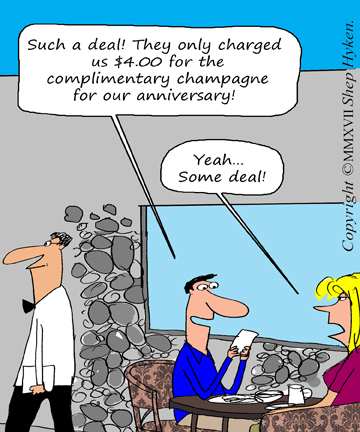 My buddy went to dinner with his wife to celebrate their anniversary. The server overheard them talking about how many years they had been married and was flattered they chose to spend their special night at the restaurant. So, he brought them over complimentary champagne. They were surprised and most appreciative. That is, until the bill came.
My buddy went to dinner with his wife to celebrate their anniversary. The server overheard them talking about how many years they had been married and was flattered they chose to spend their special night at the restaurant. So, he brought them over complimentary champagne. They were surprised and most appreciative. That is, until the bill came.
As my friend looked over the bill he noticed there were two complimentary glasses of champagne on the bill had a charge of two dollars per glass. Since it was only four dollars, and rather than have a confrontation with the server, he just paid the bill. A perfect evening derailed when the surprise champagne turned out to be a bigger surprise than he expected.
That four dollars nagged at him all night. The next day he decided to let the owner know that charging four dollars for two glasses of complimentary champagne was wrong. And, when he called the owner, the owner was mortified. He couldn’t believe it and apologized profusely. There was a good explanation. It turns out that there should have been no charge for the drinks, but for the purposes of book keeping, the bartender had to charge something for the drinks. The next step would have been to reverse the charge. That’s something the bartender forgot to do.
So, there was a legitimate explanation. My friend will go back, and I’m sure the owner of the restaurant will go overboard to take care of him. However, that is not what this lesson is about.
What would have happened if my friend chose not to call the owner? I found out, because I asked him. He told me that he would never go back to the restaurant. Ever! And, he would tell his friends about how they “nickel and dimed” him. He isn’t sure why he called the owner that day. He said, “I was just so surprised I had to let him know how unhappy I was about it.”
We all know the stats. Depending on the ones you read, up to 96% of customers who have a complaint, don’t make the complaint. They just don’t come back. But we thought they were happy.
In this case, my friend had a legitimate complaint. What caused it was a breakdown in the system. The good intentions of the server and the restaurant were ruined because a bartender accidentally didn’t properly put in the order.
So, what’s the lesson here? Fix the system. What other process can be created to ensure this mistake never happens again? To me, it’s simple. I’m not a restaurateur, but I asked my friend who is and he said, “Assign a dollar value of zero to complimentary drinks. Then it won’t show up as a charge that has to be reversed.”
How many processes in your business can, because of human error, cause a Moment of Misery? What complaints can be avoided by making a common-sense change? Are you losing business but gaining negative word-of-mouth advertising that you may unaware of because of a breakdown in these processes? Think about these questions and come up with some answers.
Shep Hyken is a customer service expert, keynote speaker and New York Times bestselling business author. For information contact or www.hyken.com. For information on The Customer Focus™ customer service training programs go to www.thecustomerfocus.com. Follow on Twitter: @Hyken
(Copyright © MMXVII, Shep Hyken)
Save
Save
Save
Save
The post Complimentary Should Mean Free appeared first on Shep Hyken.
June 20, 2017
Amazing Business Radio: John Hall
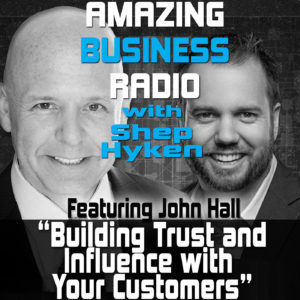
John Hall Shares Tips on Building Trust and Influence with Your Customers
How do you increase your influence with your customers?
Shep Hyken interviews John Hall, author and CEO/co-founder of Influence & Co., a content marketing agency that helps brands and individuals leverage expertise to create, publish, and distribute content. John shares how everyone can overcome trust barriers and build confidence and top-of-mind awareness through content marketing.
First Up:
Shep’s opening comments focus on creating trust and confidence with your customers. The old saying is people like to do business with people they know, like, and trust. The knowing and liking are easy, but the trust takes more. Trust requires your customers to see you as an expert, and they must value your knowledge. In order to influence your customers, trust is crucial.
Featured Interview:
Shep begins the interview discussing with John Hall how to influence your customers. John discusses trust barriers, and how to overcome them by creating trust in another way, with content marketing, which includes articles, blogs, videos, and more. Look for content triggers (which are ah-ha moments that reveal ways you can provide content to help your customers) to spark ideas for key points to focus your content on. Your goal is to add value for your customers to be able to engage with you and stay relevant in their minds.
John introduces us to the term moment of vulnerability, which is a moment that emotion is tied to an interaction. This moment will most likely be remembered – it is up to you to manage that moment into a positive interaction, or a Moment of Magic®. These emotional moments, or moments of vulnerability, can lead to trust by helping a customer at the right moment.
Top Takeaways:
Consolidation. This happens when you move from the customer’s short-term memory into long-term memory. It is easiest to make this happen by having an emotion tied to an interaction or a moment of vulnerability.
Build trust. Consistently work on building trust with your customers, whether it’s through content marketing, a gift, or even a simple phone call – keep your customers engaged.
Engage your customers. Stay “top of mind” with your customers. The easiest way to do this is to consistently provide engaging content to your followers and prospects. Important Note: It’s not necessary to create all the content yourself. It can be an article written by and/or about someone else, but it’s of interest to your customers. The key is to provide valuable content regularly.
About:
John Hall is the CEO and co-founder of Influence & Co., a tech-enabled content marketing agency that helps brands and individuals extract and leverage their expertise to create, publish, and distribute content to gain influence, visibility, and credibility with their key audiences. John has been called “one of the most powerful people in media that you’ve never met” by Inc. and a “must-see keynote speaker” by Forbes. He is the author of the book “Top of Mind: Use Content to Unleash Your Influence and Engage Those Who Matter To You.”
Shep Hyken is a customer service and experience expert , best-selling author and your host of Amazing Business Radio.
“If someone trusts you, they’re more willing to do something you would like them to do.” – John Hall
This episode of Amazing Business Radio with Shep Hyken answers the following questions … and more:
How do I create a content marketing strategy?
What is content marketing?
How do I keep a customer engaged?
How to I stay connected with customers?
How do I influence customers?
How do I create trust with customers?
What is a moment of vulnerability?
How do I stay on my customer’s mind?
Save
Save
The post Amazing Business Radio: John Hall appeared first on Shep Hyken.
June 19, 2017
5 Top Customer Service Articles For the Week of June 19, 2017
Each week I read a number of customer service and experience articles from various online resources. Here are my top five picks from last week. I have added my comment about each article and would like to hear what you think too.
6 Ways Social Media Can Help Build Customer Loyalty [Infographic] by Hospitality Net
(Hospitality Net) Now that we live in the digital age, it is only important to take advantage of new platforms to expand operations and boost business growth. And while it’s true that websites and social media are all effective as a platform for promoting products and services online, it is also important to use these channels to strengthen one of the most important aspects of the business: customer loyalty.
My Comment: It’s hard to believe how many companies are still not using social media to help with their marketing and customer support. This article breaks down several ideas that any company in any industry can take advantage of. Following the short article is an “infographic” that illustrates the same information. So, if you’re not using social media to support your customers, read this article. And, if you are, read it anyway!
10 Tactics For Great Customer Service by Cheryl Rosen
(TravelMarket Report) Here are 10 tips to take your customer service to the next level and keep your customers not just satisfied, but coming back.
My Comment: One of the amazing speakers on our team at Shepard Presentations, Buddy Rice, was one of the keynote speakers at the TravelMarketPlace in Toronto last week. This article is a recap of his top ten points, all focused on customer service. And, you don’t have to be in the travel industry to appreciate and implement these ideas. These are “universal truths.”
Customer service tip: Check your light bulbs by George Aveling
(George Aveling) Most customer service training courses teach the importance of “doing the little extra things” to create a happy customer. This article focuses on the other end of the scale – getting the basics right to avoid customers losing trust and confidence in your company.
My Comment: George Aveling sent me his latest blog post – all the way from Kuala Lumpur. The focus of this article is about trust and managing the details. George tells a short story about how a burnt out lightbulb can erode trust and confidence. A quick and entertaining read that makes a strong point.
AI Can Comb Through Your Data to Create More Compelling Customer Experiences by Blake Morgan
(Harvard Business Review) The world has more data than ever before. In fact, it’s estimated that by 2020, we’ll produce 44 zettabytes every day. That’s equal to 44 trillion gigabytes. One gigabyte can hold the contents of enough books to cover a 30-foot-long shelf. Multiply that by 44 trillion. That’s a lot of data — too much for most companies to process. And yet front-line employees are still often left operating with data that’s “too little, too late.”
My Comment: The problem with Big Data is that it’s always been… so big! Too much data makes it hard and confusing to know what is the important data that will enhance the customer experience. Thanks to AI (Artificial Intelligence), a machine can now do the heavy lifting – combing through huge amounts of data and only using what is relevant.
Good Seller to Great Seller: Learn to Build Long-Lasting Relationship with Customers by Hassan Mansoor
(CustomerThink) Getting consumers to make a purchase from your company is the first step to transforming them to into customers. Once someone is a customer, you need to establish a relationship to retain their business long-term. Satisfied customer retention is the key to moving from good selling to great selling as a business.
My Comment: If you’ve been reading my weekly round-ups for any length of time, you’ll notice that I like articles that have lists. Well, here is a great list of seven ways to build long-term relationships with your customers. You will probably say these are common sense. If so, then why aren’t more companies doing them?
Shep Hyken is a customer service expert, professional speaker and New York Times bestselling business author. For information contact or www.hyken.com . For information on The Customer Focus™ customer service training programs go to www.thecustomerfocus.com . Follow on Twitter: @Hyken
The post 5 Top Customer Service Articles For the Week of June 19, 2017 appeared first on Shep Hyken.
June 16, 2017
Guest Blog: Voice – Still The Most Important Customer Service Channel
This week we feature an article by Felix Winstone who says that while technology has impacted our approach to customer service, the oldest channel of communication, voice, is the most important. – Shep Hyken
We live in a digital world. Approaches to customer service are continually shifting to keep up with how people adopt new technology. Self-service, web chat and chat bots gain in popularity. But which customer service medium is the most effective?
Most customers will visit an organization’s website as their first point of interaction. While web chat is suited to simple information exchange, and self-service is ideal for transactional commerce, not all customer interactions are so straightforward. Complex websites and high priced products often require a more tailored, personal service. Things need to be explained. As consumers, we can all relate to that point in your customer journey where you just need to talk to a real person. Since face-to-face is often inconvenient, the most powerful form of communication is to talk over a voice call.
Businesses can better inform, empathize, and connect with customers by speaking on the phone. Voice, the oldest channel of communication, is still the most important for customer experience.
While automation and chat bots may solve trivial issues, by definition any issues they do not solve are non-trivial. Such issues usually involve complexity, persuasion, and irrationality. Humans are better at handling these issues by speaking about them with customers.
Voice reaches a fundamentally different part of the brain than reading text, which allows for far more meaningful interactions than is possible with a chat message, regardless of whether written by a bot or human.
A smile is more powerful than even the slickest website, and your customers can detect if you are smiling during a voice call.
Some organizations purposefully do not offer web self-service, instead encouraging customers to call them. This is driven by the fact that these voice-based interactions allow deeper human-to-human engagement, which is vital for increasing order values, driving brand recognition, and delivering great customer experiences.
While organizations have greater reach than ever in this digital age, in many ways our human connection is being lost. As many brands shut down retail locations, voice interactions are their only real form left of connecting with customers as fellow human beings, not merely as a commercial digital presence.
Will artificial intelligence (AI) change this?
There is no doubt that AI will automate many customer service interactions. However, even with the inevitable rise of chat bots, there will always be a place for real human voice interactions.
Humans have fundamentally different attributes to machines. Machines are infinitely more efficient than humans in many aspects. Deep learning gives systems narrow expertise. However, machines lack softer skills. Humans are still better at making emotional connections with other humans.
As AI increases in sophistication, the customer service industry will see more and more tasks fall into the domain of automation, with human tasks reserved for more personalized interactions. Chat bots and AI are likely to be the ‘front line’ customer service tools, with only the most complex requests being filtered through to a specialist human supervisor.
Even with human-level AI, there will still be a place for human-to-human phone interactions. Would you rather take holiday recommendations from the smartest bot in the world or a human tour guide who has lived in your planned destination? Travel is just one industry that will always use voice for customer interactions.
As Amazon’s Alexa service is showing, there are many opportunities for voice to be leveraged with new technology. While we can look forward to innovative methods of delivery in the future, voice is surely here to stay as the most powerful form of customer service communication.
Felix Winstone is a co-founder at Talkative, a company that brings face-to-face customer service back into websites and allows companies to communicate with customers in an engaging and personal manner.
For more articles from Shep Hyken and his guest contributors go to customerserviceblog.com.
Read Shep’s latest Forbes Article: Half Of People Who Encounter Artificial Intelligence Don’t Even Realize It
The post Guest Blog: Voice – Still The Most Important Customer Service Channel appeared first on Shep Hyken.
June 14, 2017
Does This Dress Make My Butt Look Big
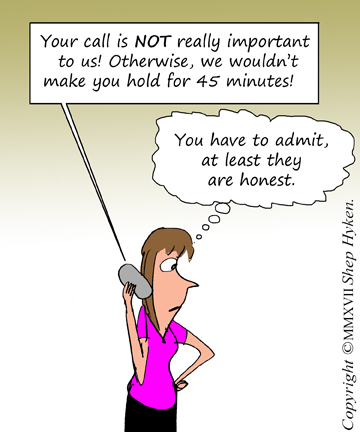 We must always be honest with our customers. Even if it is something the customer doesn’t want to hear.
We must always be honest with our customers. Even if it is something the customer doesn’t want to hear.
Many of you will be able to relate to this. My wife holds up two pairs of shoes and asks me, “Which pair of shoes do you like better?” I know I’m in trouble. Is she really interested in my opinion? Or is it a trick question? In her mind she already knows the answer. She just wants me to confirm the answer. I have a 50/50 chance of giving her the correct response. And, even if I choose the correct pair of shoes, she is going to wonder why I didn’t choose the other. Only one other question she asks could get me in more trouble: “Does this dress look good on me?” But at least she didn’t ask, “Does this dress make my butt look big?” Although she just might as well have.
Early in our relationship the answers to these questions could have had negative consequences. At a minimum, I could have inadvertently hurt her feelings. However, very quickly I learned that honesty really is the best policy. So, we talked about these types of questions, and the dilemma they potentially posed to both of us. We agreed from that point on I could answer honestly, without consequences. In other words, without having to worry about a wrong answer that might upset her or hurt her feelings. On her end, before asking the question, she would have to be sure that she really wanted my honest answer. Believe it or not, it has worked.
I share this with you because the relationship we have with our customers is not that different than the relationship we have with a spouse, partner, significant other – or any other person that is close to us. Everyone wants honesty. They want the truth, even when the truth hurts.
Yes, we need to approach certain delicate subjects with more diplomacy, empathy or care. But, in the end, we can’t lie. We can’t misrepresent or dodge the truth. It’s there.
If a shipment is going to be late, tell the customer before it’s late – because once it’s late, it’s too late. Or, if there is a price increase, let the customer know before they are surprised when they get their bill. I could go on and on with examples like these, but you get the idea. Sometimes we have to tell our customers something they don’t want to hear. But it’s better than not doing so. And, done the right way, it can actually strengthen the relationship.
When there is a problem, or Moment of Misery™ as I like to call it, seize it as an opportunity to turn it into a Moment of Magic®. Be upfront, proactive and tell the customer the way it is. Short term, customers may not be happy, but in the end, they will appreciate you for your honesty and, as a result, have a higher level of confidence in you and your organization.
Shep Hyken is a customer service expert, keynote speaker and New York Times bestselling business author. For information contact or www.hyken.com. For information on The Customer Focus™ customer service training programs go to www.thecustomerfocus.com. Follow on Twitter: @Hyken
(Copyright © MMXVII, Shep Hyken)
Save
Save
Save
The post Does This Dress Make My Butt Look Big appeared first on Shep Hyken.
June 13, 2017
Amazing Business Radio: John Rossman
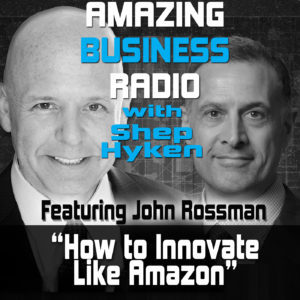
John Rossman on How to Innovate Like Amazon
What makes Amazon great?
Shep Hyken interviews John Rossman, author of The Amazon Way: 14 Leadership Principles of the World’s Most Disruptive Company and former executive at Amazon. John shares how Amazon creates a culture of operational excellence and innovation – and why you should, too.
First Up:
Shep Hyken’s opening comments focus on Amazon, and how when it started, it was only selling books. At first, nobody thought much about them. But soon that started to change. Major book retailers started to struggle; some even went out of business. The internet was starting to change how buying books worked, and Amazon was ahead of the curve. Jeff Bezos showed the book industry – and the rest of the business world – the importance of constant innovation. Why is it so important? Somebody in your industry, like Jeff Bezos, is likely going to find a way to do things better, quicker, cheaper, faster or more conveniently. Because of its innovation, Amazon went from an online bookseller to the leading e-commerce company. And, even today at the top of their game, they’re still constantly pushing the envelope to become even better and more efficient.
Featured Interview:
Shep begins the interview by asking John Rossman what he believes has made Amazon great. John shares that one of the big differences between Amazon and other companies, is that at Amazon’s leaders are empowered and expected to make changes and to do the right thing. They avoid the mentality of “this is my job, and that is an issue outside of my job, so I am going to ignore it or leave if for somebody else.” In short, they’re expected to engage issues rather than respond to them with an excuse.
When you are dealing with hard, new, innovative concepts, it is always easy to come up with reasons why something can’t get done. But the expectation of a leader and innovator at Amazon is to get it done – to make something new and bigger. And they get there by constantly forcing themselves to figure out how to create a better experience for their customers.
Top Takeaways:
Obsess over your customers. Leaders at Amazon work vigorously to earn and keep customer trust.
Invent new capabilities and simplify things. Making things simple for the customer can be as hard as inventing new capabilities. Simple is not always easy to do.
At Amazon, the customer experience is never done. When you think of the customer experience as being broader than just what your products or services provide, you will come up with new ideas on how to expand your business. That’s how Amazon grew from being just an internet-based seller of books to the e-commerce giant that it is today.
Deliver hard results, despite dependencies and setbacks. When you set the expectation that there is no choice but to succeed, then leadership and employees will find ways to succeed that they had never expected.
About:
John Rossman is the author of The Amazon Way book series, and a Managing Director at Alvarez and Marsal (A&M), a global professional services firm. John is an expert in innovative and digital business models and organizational change, including internet of things (IoT). Prior to A&M, John was an executive at Amazon.com where he launched their third party selling business, which today is over 50% of all Amazon units and supports over 3 million sellers.
Shep Hyken is a customer service and experience expert , best-selling author and your host of Amazing Business Radio.
“Spending money on the customer experience is the best marketing you can get.” – John Rossman
This episode of Amazing Business Radio with Shep Hyken answers the following questions … and more:
What makes Amazon great?
Why should you become obsessed with the customer?
How is the Internet of Things reshaping business?
Why is it important to continually innovate?
What is the best form of advertising or marketing?
Is customer service marketing?
Save
The post Amazing Business Radio: John Rossman appeared first on Shep Hyken.








